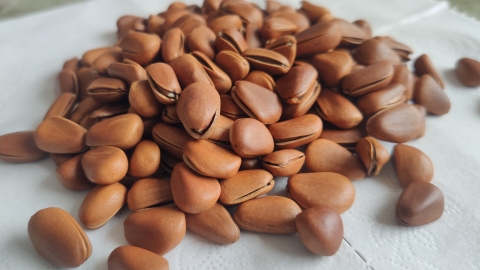What are the benefits and drawbacks of eating pine nuts?
Generally, the benefits of eating pine nuts include supplying high-quality fats, providing abundant vitamins, replenishing minerals, increasing dietary fiber intake, and delivering energy; common drawbacks typically include high caloric content leading to weight gain, potential indigestion, increased gastrointestinal burden, risk of allergic reactions, and disruption of blood lipid balance. A detailed analysis is as follows:

I. Benefits
1. Supply high-quality fats: Pine nuts are rich in unsaturated fatty acids, which help regulate metabolism and support normal bodily functions.
2. Provide abundant vitamins: They contain various vitamins such as vitamin E and vitamin K, which participate in multiple physiological processes and contribute to normal body function.
3. Replenish minerals: Pine nuts are rich in minerals like magnesium, zinc, and iron. Magnesium helps maintain bone health, zinc plays a role in immune regulation, and iron supports blood formation.
4. Increase dietary fiber intake: Dietary fiber promotes intestinal motility, helps maintain bowel regularity, and reduces gastrointestinal discomfort.
5. Deliver energy: Containing carbohydrates and fats, pine nuts can quickly supply energy to the body and are suitable as a post-physical-exertion snack.
II. Drawbacks
1. High calories may lead to weight gain: Pine nuts are calorie-dense. Excessive consumption can result in excessive calorie intake, with surplus calories being stored as body fat, thereby increasing body weight.
2. May cause indigestion: Their high oil content can increase digestive burden. Especially for individuals with weak gastrointestinal function, overconsumption may lead to bloating, diarrhea, or other discomforts.
3. Increase gastrointestinal burden: The relatively hard texture of pine nuts may mechanically irritate the digestive tract if not thoroughly chewed, reducing digestive efficiency.
4. Risk of allergy: Some individuals are sensitive to components in pine nuts and may experience allergic reactions such as skin itching, rashes, or breathing difficulties after consumption.
5. Disrupt lipid balance: Although they contain unsaturated fatty acids, excessive intake still leads to high fat consumption, potentially negatively affecting blood lipid levels.
In daily consumption, pine nut intake should be controlled—avoid eating too much at once. Individuals with weak digestive systems should reduce consumption. If any adverse reactions occur after eating pine nuts, stop immediately and seek medical attention if necessary.




